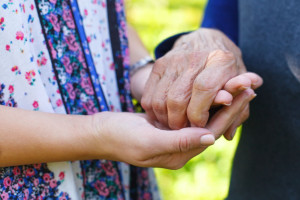Caring Without Guilt: How Caregivers Can Embrace Help and Prioritize Their Well-Being
 Being a caregiver is one of the most compassionate and challenging roles a person can undertake. Whether you’re caring for an aging parent, a child with special needs, or a loved one with a chronic illness, the responsibilities often feel overwhelming. The desire to do everything yourself, to be there at every moment and handle every task, can weigh heavily, leading to feelings of guilt when you can’t. But here’s an essential truth: You don’t have to do it all alone, and taking care of yourself is not selfish, it’s necessary.
Being a caregiver is one of the most compassionate and challenging roles a person can undertake. Whether you’re caring for an aging parent, a child with special needs, or a loved one with a chronic illness, the responsibilities often feel overwhelming. The desire to do everything yourself, to be there at every moment and handle every task, can weigh heavily, leading to feelings of guilt when you can’t. But here’s an essential truth: You don’t have to do it all alone, and taking care of yourself is not selfish, it’s necessary.
Understanding Caregiver Guilt
Caregiver guilt is a very real and common experience. It often stems from the deeply ingrained belief that you should be able to meet every need of your caree perfectly and consistently. When you fall short or decide to take time for yourself, that guilt creeps in, whispering that you’re failing or not doing enough.
But the reality is far more nuanced. Caregiving is an ongoing marathon, not a sprint. It’s physically, emotionally, and mentally demanding. Expecting yourself to “do it all” is simply unrealistic, and harmful. The guilt, if left unchecked, can lead to burnout, resentment, and ultimately, reduced quality of care for both you and your loved one.
Why Asking for Help Is Crucial
One of the most powerful tools for caregivers is learning to ask for help. This might feel uncomfortable at first, especially if you’re used to being the one who takes charge. But reaching out isn’t a sign of weakness, it’s a sign of wisdom and strength.
Asking for help benefits everyone involved:
For you: It gives you a chance to rest, recharge, and maintain your own health and sanity.
For your caree: It ensures they receive the best possible care from a team, preventing caregiver fatigue that could compromise their well-being.
For your relationships: Sharing responsibilities helps strengthen bonds with family, friends, or professional helpers who want to support you but might not know how.
Whether it’s arranging for respite care, inviting a friend to help with errands, or joining a caregiver support group, tapping into available resources makes the journey more sustainable.
You Can’t Be Everywhere at Once — and That’s OK
It’s important to internalize this simple but profound fact: No one can do everything all the time. Caregiving, like life, involves balance and priorities. Trying to be omnipresent and omnipotent sets impossible standards.
Instead, focus on what you can control and be realistic about your limits. Delegating tasks—whether it’s meal prep, transportation, or medication management, does not mean you care less. It means you’re protecting your capacity to provide quality care over the long haul.
Practical Steps to Alleviate Guilt and Embrace Support
Identify Your Limits: Take time to honestly assess what you can realistically manage in terms of time, energy, and emotional bandwidth. This self-awareness is the foundation for asking for the right kind of help.
Build a Support Network: Family members, friends, neighbors, community organizations, and professional caregivers can all be part of your circle. Don’t hesitate to lean on them.
Communicate Openly: Let your loved one and those around you know when you need help. People often want to assist but don’t know when or how unless you tell them.
Accept Imperfection: Sometimes things won’t be done exactly as you would do them, and that’s okay. What matters most is that the caree’s needs are met safely and compassionately.
Schedule Time for Yourself: Regular breaks, hobbies, social time, or even simple moments of quiet can recharge your spirit. Remember, your well-being directly impacts your caregiving.
Seek Professional Support: Caregiver counseling, support groups, or coaching can provide emotional tools and community connection to ease feelings of isolation and guilt.
The Ripple Effect of Self-Care
Taking care of yourself is not a luxury; it’s a responsibility. When you’re well-rested, less stressed, and emotionally supported, you provide better care. Your patience increases, your mood improves, and your resilience strengthens. This positive ripple effect benefits your caree profoundly.
By normalizing the need for help and self-care, you model healthy behavior for others in your family and community, encouraging a culture of shared responsibility rather than lone sacrifice.
Final Thoughts
If you’re a caregiver, remember: It’s okay not to do everything yourself. It’s okay to ask for help. It’s okay to take time for you. These choices don’t diminish your love or dedication, they sustain it.
Caring for someone else starts with caring for yourself. You deserve compassion too. By releasing guilt and embracing support, you’ll find caregiving becomes a more manageable, meaningful journey, not a burden.
So, take a deep breath. Reach out. Set your boundaries. And know that in doing so, you are doing the best you can, and that is enough.






